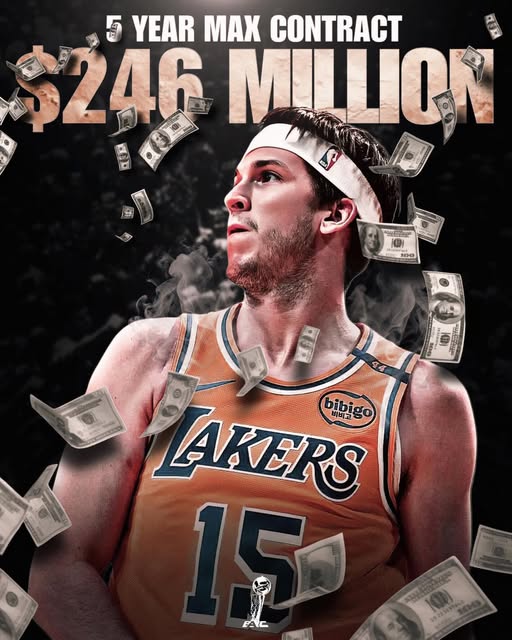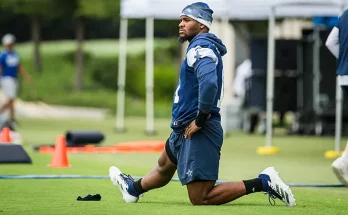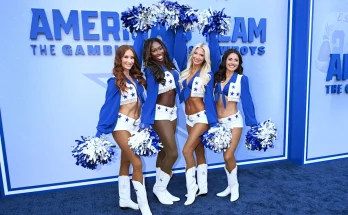Austin Reaves has quietly evolved into one of the most valuable young talents in the NBA, and if he opts out of his current player option next summer as expected, the Los Angeles Lakers will face a massive financial decision—and a pivotal moment for their franchise. The 26-year-old shooting guard will be eligible for a five-year, $246 million maximum contract with the Lakers, or a four-year, $183 million max deal from any other team in the league. For a player who went undrafted just a few years ago, the stakes have never been higher.
Reaves’ rise has been nothing short of extraordinary. From an undrafted rookie clinging to a two-way contract, to a playoff-tested starter and trusted sidekick to LeBron James, he’s proven time and time again that he belongs in the NBA’s upper tier of guards. His growth hasn’t just been about stats—it’s been about reliability, composure under pressure, and a versatility that few players in his position possess. Now, with free agency looming next summer, the Lakers are staring at a looming financial fork in the road, and Reaves will have all the leverage.
If Reaves chooses to decline his player option for the 2025–26 season—which seems all but certain—he immediately becomes one of the most sought-after players in free agency. The Lakers will have the inside track, not only because they hold his Bird Rights, but because they can offer him the richest possible deal: five years, $246 million. That’s a franchise-level commitment and a declaration that Reaves is a core piece of the team’s future beyond the LeBron era.
But money talks across the league. And while the Lakers can offer the most, rival teams can still offer a max of four years and $183 million. That kind of payday is still transformative, and teams with cap space and a need at guard—like the San Antonio Spurs, Orlando Magic, or Philadelphia 76ers—could make a hard push to lure him away. The question becomes: What does Reaves want, and what direction do the Lakers intend to go?
From a financial perspective, betting on Reaves could be a calculated risk that pays off in the long run. He’s improved each year since entering the league. His shooting splits are efficient. His defense has matured. His ability to play both on and off the ball makes him a unique fit alongside almost any superstar. He’s shown he can shoulder scoring responsibility when called upon, but he’s just as comfortable setting up others or making the right rotational read defensively. That kind of well-rounded skill set is exactly what contending teams crave.
Still, $246 million is a franchise-altering sum. Committing that kind of money over five years means Reaves would be expected to evolve into an All-NBA caliber player, or at the very least, one of the league’s top secondary stars. It’s a leap from his current role, but one the Lakers might be willing to make—especially with an aging LeBron James and uncertain timelines ahead.
Reaves has built undeniable chemistry with LeBron and Anthony Davis, and that on-court synergy may push the Lakers toward locking him in long-term. Reaves has also been vocal about his desire to play in Los Angeles and his admiration for the organization, city, and fanbase. But desire doesn’t always align with dollars, and the NBA is a business above all. Even if Reaves and the Lakers both want a continued partnership, cap space and long-term strategy will influence the deal’s structure and timing.
Should Reaves opt for the open market, he’ll find no shortage of suitors. Teams like the Magic and Spurs have the cap flexibility and are building intriguing young cores. A player like Reaves could immediately serve as a veteran-styled leader, even in his mid-20s. With his playoff experience and proven production under pressure, he’s an attractive option for any franchise looking to make a leap from development to contention.
The 76ers are another potential landing spot that could tempt Reaves with a starting role next to Joel Embiid and potentially Paul George or another superstar. With James Harden gone and Tyrese Maxey emerging, Reaves could slot in as a dependable two-way option that bridges their backcourt and helps stabilize the roster. Philadelphia is always looking for players who can thrive in the postseason, and Reaves’ 2023 playoff performances proved he can.
Then there’s the matter of fit. On most teams, Reaves would not just be a starter—he’d be a focal point. He wouldn’t need to defer to a pair of superstars. He could touch the ball more, create more offense, and build a brand of his own. That type of opportunity—along with a $183 million offer—might be enough to make him pause, even if he loves L.A.
But for all the theoretical interest around the league, the Lakers remain in the driver’s seat. They control the most important levers: money, legacy, and familiarity. Reaves’ development within their system has been methodical, and they’ve shown faith in him, even as he was doubted elsewhere. Locking him up to a long-term deal would reinforce their commitment to continuity and homegrown growth—something the franchise hasn’t always prioritized in the past.
The timing of this potential extension will be just as interesting as the dollars. The Lakers have to navigate LeBron’s own contract decisions, Anthony Davis’ long-term health, and the possibility of swinging a trade for another star. How they structure their cap sheet—and whether they can afford to tie up nearly $50 million annually in Reaves—will be a storyline all year.
There’s also a basketball argument to be made for waiting. If Reaves continues to ascend and makes his first All-Star appearance in 2025, his value and reputation across the league will only grow. A breakout season could put the Lakers in a position where letting him walk is unthinkable, or where another team’s max offer becomes even more dangerous. The inverse is also possible: if his production stalls or if injuries arise, the Lakers might hesitate to invest at the max.



